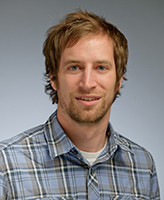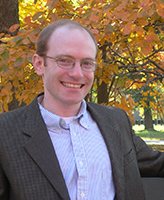Notre Dame’s Department of Economics has bolstered its strengths in development economics and healthcare policy with two new hires, who bring with them the invaluable experience of being advised by major figures in the field.
Assistant Professor Kevin Donovan comes to Notre Dame from Arizona State University where his faculty adviser was Nobel laureate Edward Prescott, while Assistant Professor Ethan Lieber’s adviser at the University of Chicago was Steven Levitt, winner of the John Bates Clark Medal and author of Freakonomics.
“Kevin’s teaching will primarily focus on development economics, a popular course with both economics majors and international economics majors,” says Richard Jensen, Gilbert F. Schaefer Professor of Economics and chair of the department.
“Ethan’s expertise in health care markets is also an excellent fit for our department’s focus on policy-relevant research, and the many economics majors interested in healthcare policy,” Jensen says.
Building Bridges

Donovan, a faculty fellow at the University’s Kellogg Institute for International Studies, focuses on research that can impact policies to help the developing world. Recent projects have examined risk and decision-making by farmers in low-income countries and business owners in Uganda.
Currently, Donovan is working on a project in Nicaragua with Assistant Professor of Economics Wyatt Brooks and a nongovernmental organization called Bridges to Prosperity. Partially funded by the Kellogg Institute for International Studies, the project builds footbridges over rivers that rise and become impassable during the rainy season.
“These bridges allow people in nearby communities to access markets, get treatment at hospitals, and attend schools when high rivers would otherwise keep them from doing so,” Donovan says. “We are evaluating the impact of these bridges for outcomes such as food security, health outcomes, savings behavior, and crop selection by implementing a series of household-level surveys over the next two years.”
Healthcare Markets

Lieber’s research on healthcare pursues a wide range of issues including how access to pricing information affects consumer decisions.
Currently, he is working with Lee Lockwood of Northwestern University on a classic economics proposition: whether aid should be provided to people by giving them cash or by providing a good in-kind, such as food or medical care. Though there is little empirical evidence on the question, they found that the Medicaid Home Care program allows them to evaluate both the costs and benefits of providing transfers in-kind versus in cash.
Another specific area Lieber is exploring involves President Obama’s Affordable Care Act, which contains a provision that all women 40 or older can have a free screening mammogram once a year. “The question I’m asking and hopefully answering is whether those extra mammograms actually save young women’s lives or just expose people to unnecessary stress and surgical procedures,” Lieber says.
In the Classroom
Donovan and Lieber say they chose Notre Dame because of its commitment to excellence in teaching as well as research.
This semester, Lieber is teaching Principles of Microeconomics, the first economics class students take. “It is aimed at conveying some of the big ideas economics has to offer and helping students apply these ideas in their lives at Notre Dame and beyond,” he says.
Donovan is teaching Development Economics, a junior/senior-level class. “The goal is to get students thinking about the important issues facing the developing world, and how economists go about testing potential theories of economic development,” he says.
Both men say they are excited about joining the Department of Economics at Notre Dame because of its strong and growing reputation.
“The department stands out from other economics programs for (at least) two reasons: the faculty’s commitment to high quality research and teaching as well as its continuing expansion,” Lieber says. “These make it an engaging and exciting environment for young scholars.”


